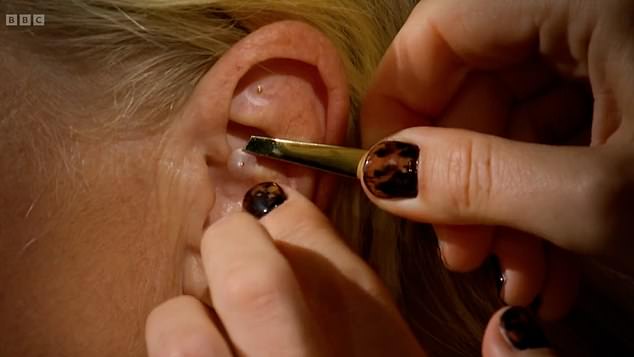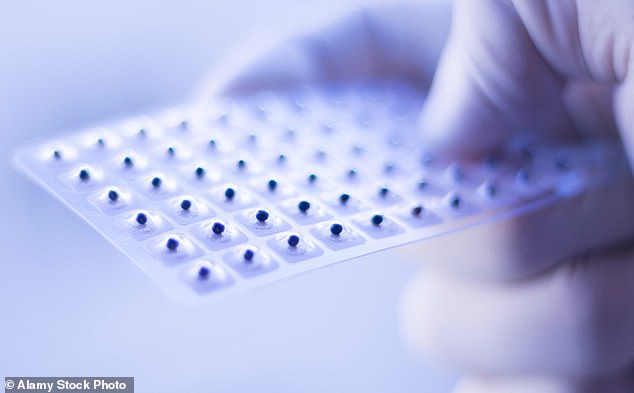The patients who say Dragons’ Den entrepreneur’s ‘snake oil’ ear seeds DO work: Cherie Blair was once photographed wearing them – while Kate Moss is said to have used them to help her overcome a cocaine addiction
Could sticking small metal beads to your ear really help relieve the crushing symptoms of ME?
That’s the question asked this week, after an entrepreneur insisted the devices, known as ear seeds, helped her recover from the disease within a year.
Critics were stunned earlier this month when Giselle Boxer, 31, from Sheffield, received offers from all six judges of BBC show Dragons’ Den for a stake in her company Acu Seeds. The mother-of-one eventually accepted £50,000 from Dragon Steven Bartlett, also 31, for 12.5 per cent of the company, which sells packets of gold or silver-plated ear seeds for £30.
ME – which stands for Myalgic Encephalomyelitis – is a debilitating, complex disease that affects 250,000 people in the UK.
Also known as chronic fatigue syndrome, or ME/CFS, symptoms include pain, brain fog, fatigue and an inability to recover after expending even a small amount of energy. Although several treatments aim to help patients cope, and some heal over time, many are ill for years and there is no cure.
Giselle Boxer, 31, from Sheffield, received offers from all six judges of the BBC show Dragon’s Den, for a stake in her company Acu Seeds
Giselle said ME couldn’t talk to her “for more than five minutes.” But she said a combination of diet, acupuncture, Chinese herbs and ear seeds led to “recovery within 12 months” and she became pregnant shortly afterwards.
The episode sparked a furious response from doctors and ME patients, who accused her of selling ‘snake oil’, preying on the ‘most vulnerable and terribly ill people in society’ without scientific support to help ME.
The outcry was so great that it led to complaints to both the BBC and the Advertising Standards Authority.
Meanwhile, Giselle stood by her claims. So what is the truth?
Is Giselle just a snake oil salesman? So ear seeds have no benefit at all for people with ME?
Proponents – and there are many – claim that ear seeds work on the same basis as acupuncture, the Chinese medical practice of inserting hair-thin needles into points around the body. It is claimed that this can help treat a wide range of diseases.
However, instead of actually piercing the skin, the beads apply a small amount of pressure.
Each seed has a diameter of approximately 2 mm and is attached to a small sticker. These are taped at various points around the ear. The theory is that this opens invisible energy pathways, or chi, that flow through the ear to the parts of the body that need help healing.
The Acu Seeds website claims that the beads, which are left on the ear for five days, can help with fertility, pain, headaches and digestion, depending on where they are placed.
Former Prime Minister Tony Blair’s wife Cherie was once photographed wearing ear seeds – while supermodel Kate Moss is said to have used them to help her overcome a cocaine addiction.

Cherie, the wife of former Prime Minister Tony Blair, was once photographed wearing ear seeds

Kate Moss is said to have used ear seeds to help her overcome a cocaine addiction
But despite their celebrity status, none of the experts we spoke to were aware of the evidence that they do much at all.
Professor David Strain, senior clinical lecturer at the University of Exeter’s School of Medicine and medical adviser to the charity Action for ME, said: ‘Treatment for ME is about managing people’s symptoms.
“If those ear seeds helped Giselle feel better, then that’s great. But there is no evidence that anyone else will experience a similar benefit.”
He adds: ‘There is some evidence that acupuncture helps with some types of pain. And some patients I’ve worked with say acupuncture has helped with their fatigue. There is virtually no evidence that ear seeds have the same effect as acupuncture.’
But why is everyone so angry? It sounds like Mrs. Boxer just wants to help.
In a letter of complaint about the Dragons’ Den episode, the ME Association wrote: ‘People who have ME/CFS often have very low incomes and, in the absence of any effective medical treatment, are very vulnerable to these types of unsubstantiated therapeutic claims. ‘
Dr. Edzard Ernst, a researcher specializing in alternative medicine, added: ‘It is unethical to give false hope to severely suffering patients; to take money from them is, in my opinion, despicable.’
The cause of ME is not yet fully understood, but some research suggests that the disease may be caused by viral infections such as mononucleosis. Experts now consider it a neurological disease – one that affects the brain and nervous system.

The Acu Seeds website claims the beads can help with fertility, pain, headaches and digestion, depending on where they are placed

Each seed has a diameter of approximately 2 mm, is attached to a small sticker and remains on the ear for five days
Despite this, people with ME often face accusations that their symptoms are all in their heads. The ME Association added that patients are ‘fed up with the way unproven and expensive treatments are regularly promoted to them.’
As Professor Strain notes: ‘Many people with ME have had the disease for 40 to 50 years and have therefore been unable to start a family. Someone says they solved it with a little acupuncture and a change in diet gives strength to those who dismiss people with ME as just too lazy to get out of bed.’
Even if they help a little, isn’t it worth trying?
Experts agree that there is little risk of carrying ear seeds.
Professor Strain says: ‘I can’t imagine they would do any harm to people who have good skin, but if you are frail or very old or have very severe diabetes and something presses on the skin for five days, then there is the risk of ulcers developing.’
Infectious disease specialist Dr Alastair Miller, who once led an ME/CFS service at the Royal Liverpool Hospital, added: ‘I’m not advocating it in any way and I have no evidence whatsoever that it is is useful.’
So if they don’t work, why did Giselle get better?
Dr. Miller suggests that any improvement she experienced when using ear seeds could have been coincidental. He says that a third of ME patients will make a full recovery about six to nine months after their diagnosis, that in another third their symptoms will improve and in the remaining third their symptoms will not get much better.
He adds: ‘Oar seeds may have a placebo effect. If you think something makes you feel better, it may actually make you feel that way.”
Professor Strain says that if caught very early, ME patients have a better chance of recovery by making simple changes to their lifestyle, such as improving their diet and exercise. Meanwhile, most patients wait up to two years before receiving a diagnosis – because symptoms are often not initially recognized by their GP – and by the time research shows recovery takes longer.
What about the other things Giselle said she was trying to help her ME. Could any of these things have helped her recover?
Experts say it’s unclear what led to her recovery, as she tried a combination of different things to help.
Professor Strain says: ‘It is possible that herbs used in traditional Chinese medicines contain powerful antiviral agents, which could theoretically help. However, I’m not aware of any robust evidence for this, but I’d be open to it.
‘We don’t have a proven treatment for ME yet – but that doesn’t mean it doesn’t exist.’
So what can people with ME do to recover?
Cognitive behavioral therapy, also called CBT, a form of psychotherapy, can help. The benefit is indirect: it helps patients cope better with certain symptoms. Painkillers such as paracetamol or ibuprofen can improve the discomfort. Sufferers are also encouraged to monitor their daily activities so they can determine how to best use the energy they have.
Some people with ME find that exercise helps reduce their symptoms, although too much can lead to what is known as post-exertional malaise – where mental or physical strain can make people’s symptoms worse.
Dr. Miller says, “There’s no question that the best approach is for people to push themselves a little, but not too hard. It’s a compromise. What people need to do is exercise a little, but not to the extreme.”
